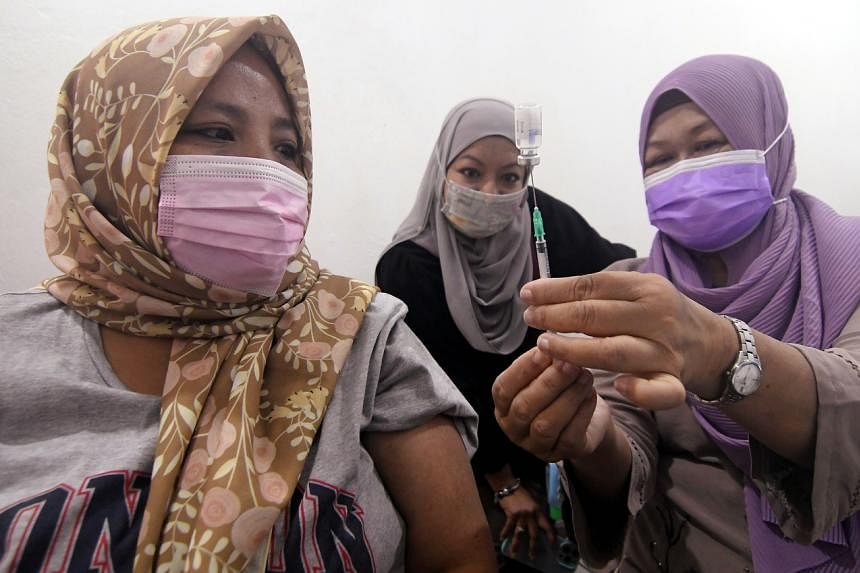KUALA LUMPUR - Malaysia is seeing a low take-up rate for the Covid-19 booster dose, which medical professionals say is recommended for high-risk groups.
Just under half of Malaysians, or 49.6 per cent, have taken their Covid-19 booster shot as of Tuesday (Aug 2). Those aged 12 to 17 have a far lower take-up rate, with only 1.5 per cent of them having received a third dose.
In contrast, about 84 per cent of the total population have received their second dose of the Covid-19 vaccine.
On Wednesday Health Minister Khairy Jamaluddin announced measures to raise vaccination levels among immunocompromised children and teenagers, by recategorising the first booster shot administered to them as the third dose needed to complete their primary vaccination.
Booster shots were needed because vaccine-induced immunity wanes in five to 10 months, Mr Khairy said in a statement.
Deputy Health Minister Noor Azmi Ghazali told Parliament on Wednesday that new variants of the Omicron strain were more infectious.
He also warned that Covid-19 cases, hospital admission, the use of ventilators and intensive care unit (ICU) occupancy have been on the rise due to Omicron variants such as BA.4 and BA.5.
Universiti Putra Malaysia epidemiologist Malina Osman told The Straits Times that people in high-risk groups, such as the elderly, those with comorbidities or who are immunocompromised, are at risk of developing severe infection from Covid-19.
"Those with a competent immune system may also be infected but the infection generally would be mild," she said.
The available vaccines are effective against the new variants including BA.5, said Dr Malina.
People who have completed vaccinations have a certain level of protection compared to those who are not vaccinated at all, she noted. But boosters are still recommended.
"Breakthrough infections may occur due to waning antibodies and certain conditions associated with an abnormal immune system. Therefore, a booster is very much recommended for those who are in the high risk group to maintain adequate protection against potential severe infection," she added.
Professor Sazaly Abu Bakar, director of the Tropical Infectious Diseases Research and Education Centre at Universiti Malaya, told ST that those who have already been infected with the coronavirus would have natural immunity.
"We currently do not know the percentage of the Malaysian population who have been naturally infected with the virus. This infection may also be treated as a 'booster' immunisation for those who have completed the two-vaccinations regime or those who have received the first booster," he said.
He added that the hallmark of an effective vaccination is the ability to stimulate the memory immune response, which should remain intact for decades.
"This memory response will be activated as soon as the memory immune cells are triggered by the subsequent infection with the virus," he said.
Observing data from countries which have seen a resurgence of cases, there is no immediate concern that it would cause a pandemic-level health challenge, he added.
Prof Sazaly said at present he did not see "compelling reasons for a second booster", but suggested that those who have not been infected by Covid-19 should get a booster shot at least six months after their last immunisation.
Mr Khairy last month urged those aged 50 to 59 without comorbidities to get their second booster shot.
He also said the Health Ministry had recommended second booster shots for those aged 60 and above, as well as to high-risk individuals aged 18 to 59.
The Health Ministry said Monday that the number of Covid-19 admissions in public hospitals per 100,000 people rose 2.8 per cent for the week of July 24 to 30.
ICU bed utilisation remained unchanged at 14 per cent for the same week.
The number of deaths during the same week fell by 28.6 per cent, from 63 cases to 49, while active cases rose 3.6 per cent to 47,176 compared with the week before.
Malaysia recorded eight deaths and 4,201 cases of Covid-19 on Tuesday, with 96.3 per cent of active cases undergoing quarantine at home. Some 70 per cent of hospital beds nationwide are currently utilised.


